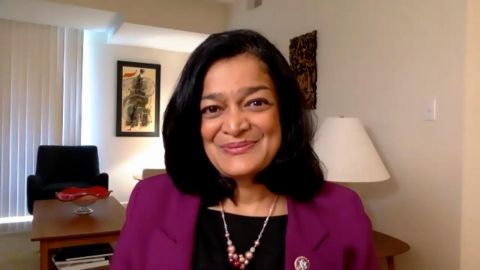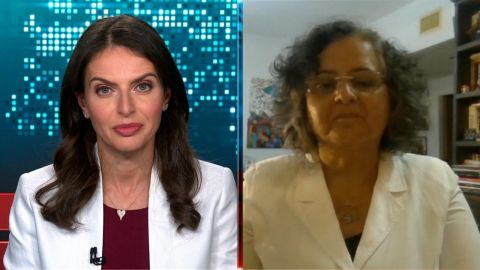Read Transcript EXPAND
BIANNA GOLODRYGA: Noa Landau, it’s been wonderful having you on. We appreciate your insights. Please come back. Thank you.
Well, now to the U.S., where the month of may celebrates the work and contribution of Asian Americans and Pacific Islanders. But, sadly, a recent
report shows anti-Asian hate crimes increased by nearly 150 percent in 2020.
Congresswoman Pramila Jayapal is the first South Asian American woman in the House of Representatives.
Here she is speaking with our Aarti Shahani about political representation and how the pandemic has impacted Asian American identity.
(BEGIN VIDEOTAPE)
AARTI SHAHANI: Thank you, Bianna.
And, welcome, Congresswoman Pramila Jayapal. It’s great to have you here.
JAYAPAL: Thank you, Aarti. It’s so great to be with you.
SHAHANI: When you see alongside this pandemic that is killing us a surge in anti-Asian violence, from attacks against elderly members of our
community, to a mass shooting in Georgia targeting women, Asian women, Asian American women, what’s your reaction to that? How do you make sense
of it?
JAYAPAL: Well, it’s horrific.
And it’s been so painful for the Asian American community. And I think it goes to this history of discrimination in this country, history of
xenophobia, history of exclusion.
I mean, none of this is new to the country. You go back to all of the anti- Asian immigration laws, from the Chinese Exclusion Act, to the Japanese internment. So I think that a lot of the anti-Asian sentiment is based in
xenophobia, white supremacy, and very much tied into all the other threads of that.
And at the same time, I think that there is there is a visibility, just as there is for black Americans, for Asian Americans. There are features that
have consistently been mocked and disparaged of Asian Americans.
There are historical, political pieces to this around communism.And you see it emerging again with the anti-China sentiment.
SHAHANI: The kung-flu virus, right.
JAYAPAL: Yes, exactly.
And you see it again with the surge in COVID infections in India and, all of a sudden, Indian Americans again getting targeted for supposedly
spreading the virus here in the United States.
So, I think that it is a very painful time. It is not new. What is new is that the Asian American community is standing up this time and really
fighting back. And we’re gaining traction, both as political actors and sort of writing, in a way, a new place for us in this political history of
the country.
SHAHANI: How are we gaining traction of political actors?
JAYAPAL: Well, what you see is, first of all, more of us that are in Congress. That makes a big difference, but not only in Congress, in elected
offices across the country, councils, county councils,state legislatures, many more of us, who are then leading the fights in our own places.
In Georgia, you saw a tremendous movement of Asian Americans in Georgia to vote, I mean, a lot of voting activity from young Asian Americans, who also
get their parents engaged in a whole different way. And that is noticed.
So, when we win states like Arizona and Georgia and even Virginia by small amounts, and these are places where the Asian American vote was enormous —
now, we also are fighting against pollsters who regularly leave Asian Americans out of their polling data, regularly forget to mention Asian
Americans.
But that doesn’t obscure the fact that we delivered victories in numerous states and races across the country. And that is being noticed. And you see
it even with the response to India. I mean, we haven’t gone as far as we would like on global vaccine equity, but it was many of us inside Congress
and many outside Congress who really pushed the Biden administration to do the TRIPS waiver, to release more vaccines to India.
And we’re still working on additional steps. But we have a newfound place to speak from and to organize from that gives us a wider acknowledgement.
SHAHANI: Right.
It’s interesting. You point to the increased voter turnout of Asian American, the decisive Asian American vote, for example, in Georgia for
President Biden. And then I can’t help but think, being a touch cynical here, that that turnout was there, that enunciation, that flexing was
there.
And then President Biden has not a single Asian American Cabinet member.
[13:30:00]
JAYAPAL: Yes. It was very, very disappointing to us. I mean, we pushed extremely hard at the Congressional Asian Pacific American Caucus and talk
about being a thorn in the side, I think we really were. Because it —
SHAHANI: You were pushed hard.
JAYAPAL: Yes, we really did. And it was a big step backwards that we didn’t get a single person in the cabinet. And, you know, there are
obviously highly placed administration officials from (INAUDIBLE). My good friend who is the surgeon general, some very dear friend, Vanita Gupta, who
is the number three at the Department of Justice, an incredibly important position. And all the way down.
SHAHANI: And we have, of course, Vice President Kamala Harris.
JAYAPAL: Absolutely. And, you know, I think one of the things that was very difficult for the Asian-American community is we were so proud of Vice
President Harris, and at the same time when we kept being told by the administration that, well, you have Vice President Harris, that is not
something you would say to the black community, you know. Well, you’ve got a vice president who’s black. So, don’t ask for any cabinet secretaries. In
fact, it was the opposite of that.
And so, I think there was a tone deafness that may have been partially rectified, you know, because of the pushback. So, don’t get me wrong, we’ve
got a long way to go and we’re going to have to keep pushing, but I do think that there are some very positive signs in terms of how we’re using
our platforms, because we do have platforms now. You know, we didn’t have Asian-Americans in Congress for a long time. And then we still have
relatively few compared to other caucuses.
But we’ve done a very good job, I think, not only in Congress but at state and local levels. You’ve got people like Bee Nguyen in Georgia, you’ve got,
you know, so many people in my home state of Washington. I was the first South Asian-American to be elected to the state legislature. But now we
have — I think it’s either four or five South Asian women who are in the state legislature along with Vietnamese, you know, other Asian-Americans
that are really making a difference.
SHAHANI: So, you were pushing the Biden administration to have Asian- American representation in the cabinet and you were told you all have Harris, that should be enough?
JAYAPAL: That was said to us many times, and it was extremely infuriating. And actually, I think, it’s what got Senator Duckworth the most angry. I
think it’s been publicly reported, perhaps not directly from her, but I think that was a level of tone deafness that was hard to stomach. We should
be happy with Katherine Tai who is in the cabinet but is not a cabinet secretary. And we love Katherine, don’t get me wrong. Again, we push very
hard for her to be there but to say that that’s equivalent to a cabinet secretary is just simply wrong.
SHAHANI: And I’m sorry. What do you make of that? You’ve used the term tone deafness. Why do you think they were tone deaf?
JAYAPAL: When you don’t have people who really are rooted in the Asian- American community in the highest levels, you don’t hear these things. You know, I think they have been focused on the Latino community, the black
community, all of which we support. And we had a lot of support from those caucuses, by the way, for an AAPI cabinet secretary. There was a joint
letter that was sent from the Tri-Caucus, what we call the Tri-Caucus, that’s the black, Hispanic and AAPI caucus, for a cabinet secretary.
So, we had a lot of support from them. But at the end of the day, you have to have someone in the White House, in the administration, who believes
that that is essential. And we did not have that. And that is why part of what was, you know, agreed to was that there would be an extremely senior
level liaison, AAPI liaison, that would be added. That person has been added. I think the jury is still out on whether that’s going to be
sufficient, but hopefully that will take us further.
SHAHANI: You and President Biden, you have expressed no shortage of concern that he wants to follow the rules of the Senate. He does not want
to get rid of the filibuster. You’re concerned that to push your agenda, the progressive agenda, changes have to be made procedurally. What is your
intent with President Biden over the coming weeks and months? How are you positioning yourself with respect to pushing him?
JAYAPAL: Well, we’ve just been very clear that if the president wants to deliver on his very bold, progressive agenda, which I believe he does, that
he will have to reform the filibuster. And he has moved on that. He went from saying, absolutely no, it was an important part of the Senate, to
saying that it was a Jim Crow relic, to saying that, you know, perhaps we could reform the talking filibuster, right?
[13:35:00]
And so, he has moved, not as far as I would like to see him, but I do think that he and his team understand that in two years or in four years if we go
back to the American people and we say, you delivered us a trifecta, a Democratic House, Democratic Senate and a Democratic White House and you
were unable to give us any of the things that you promised, from taking on climate change to passing a $15 minimum wage to passing the PRO Act and
strengthening collective bargaining, to getting money out of politics, to reforming our broken voter system that Republicans are continuing to try to
use to suppress votes, that we will lose our majorities. There’s just no question.
You can’t go back to people and say, hey, you delivered us everything but, you know, there’s this arcane rule in the Senate. And yes, it’s a rule
relic. And yes, Republicans have changed it. And, oh, by the way, the founders never intended for us to have tyranny of the minority in the
Senate, but we didn’t do anything about it. That is not going to cut it.
And so, I really believe that the Biden administration will come around on this, the Senate will come around on it. And in the meantime, we’re going
to keep pushing. And if we don’t want to turn off a whole generation of voters that came out last time because they were willing to give us one
more shot at trying to deliver for them, then we will lose again. And really, maybe we should at that point.
SHAHANI: And is any part of you worried about pushing a progressive agenda so vigorously that it becomes more divisive, that this country that’s
really struggling with talking to each other breaks even more at the seams? Do you ever worry about that?
JAYAPAL: No, because the country is actually with us. They may not call it a progressive agenda, and I actually don’t care what they want to call it.
If they want to call it a populist agenda, a mainstream agenda, it doesn’t bother me. I don’t feel like we need to have progressive attached to every
way that we describe these policies.
But I’ll give you multiple examples. Money out of politics, that’s S1 or HR1 that we passed in the House, you know, about making government
accountable to the people and not allowing these voter suppression things that are happening across the country, that is supported by a majority of
voters, Democratic, Republican, and independent. A $15 minimum wage, that, even though Republicans and a couple of Democrats aren’t ready to vote for
it, that is something that is supported by Democrat, Republican and independent because it is a populist policy. Money and checks was that way.
The American Rescue Plan was that way. The American jobs and families plan is that way. Raising taxes on the wealthiest and the corporations is that
way.
These are bold, populist, necessary policies that don’t go to ideological boundaries. They really are something that the American public wants us to
do. Voting rights is that way. I mean, I’m not worried about that at all because I really think the American people are with us on these things.
SHAHANI: Is it important for you to also work with members of the GOP? I mean, you’ve had some very strong words, for example, about your experience
on January 6th, being in chambers, locked in a room and getting COVID, following the fact that people weren’t wearing masks in that room. I mean,
you’ve expressed so much outrage at what you’ve seen around things like mask wearing. So, I wonder, do you feel committed to working with the GOP?
Do you see opportunities there?
JAYAPAL: Very few. And that hasn’t always been the case in my time in Congress. I mean, I have plenty of bipartisan bills and things I’ve moved
in a bipartisan way. But you have to understand this GOP is extremely different from the GOP of four years ago, much less 10 years ago.
The only qualification it appears to be an included member of the Republican Party today is that you pledge fealty to a one-man cult, to
Donald Trump, and to the idea that the election was stolen from him. You look at somebody like Liz Cheney who is one of the most conservative
members of the Republican Party and she was pushed out of leadership because she did not pledge fealty to the big lie and to Donald Trump.
And so, when you’re talking about that kind of a party that has no principles and no — and I mean, policy principles, though perhaps other
principles is relevant there as well, but also has no allegiance to the truth or the constitution or saving our democracy, then, no, I don’t really
have an interest in working with them because I don’t think that they are the kind of people that are actually fighting for the people.
[13:40:00]
And you see it with the rescue plan. This vote no and take the dough phrase is all about how every single Republican oppose the American Rescue Plan in
spite of the fact that it was so popular with their Republican constituents, and they went home and found that it was so popular that they
started to tout the benefits of the rescue plan without happening to mention that they didn’t vote for it. And a Senate majority leader who has
said that 100 percent of his focus in the Senate is to fight the Biden agenda.
So no, I don’t see much opportunity to work with the vast majority of Republicans. If there are some, great. Let’s have them come along but let’s
do it quickly because we cannot sacrifice the well-being and the future of the country and our democracy for these Republicans who have zero
principles anymore and are unwilling to tell the truth.
SHAHANI: And so, how do you think about the work of building unity? If you — you know, you say unconditionally you see very few opportunities to
build with the GOP. They are the other major political party.
JAYAPAL: But that is different than building unity with the American people. And that’s where, I think, we have so much wind behind our sails,
because what you see is the American people actually being unified on a whole set of issues. And let me be clear, if we were to address many of the
economic inequality and wealth inequality and the racial wealth gap, which even swing voters — I mean, we just finished doing a set of focus groups
that was fascinating, that found that swing voters in both red — you know, states that ultimately went red or states that ultimately went blue care
about racial equity.
This isn’t a class versus race conversation or gender. This is a really intersectional question. And I believe we have and have built unity with
the American people. And if we deliver for them on all of these counts, then I think we will actually take away the fuel for the fires that Donald
Trump and whatever his party now is, is using across the country to divide us.
SHAHANI: Congresswoman Pramila Jayapal, I want to thank you for your time talking with us.
JAYAPAL: Aarti, thank you so much for having me.
About This Episode EXPAND
As the lucky nations get vaccinated, a return to normalcy may not excite everyone. Some are very anxious about going back to how things were, with psychologists calling it “re-entry anxiety.”
LEARN MORE



